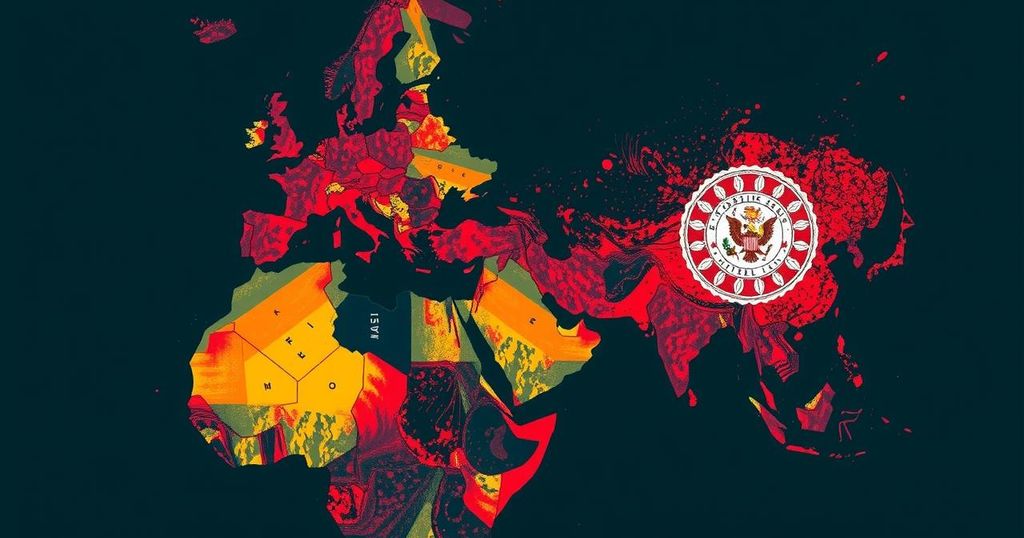Disinformation: A Major Threat to Humanitarian Operations in the DRC
The DRC faces significant humanitarian challenges due to disinformation, in addition to ongoing conflict and displacement. The World Food Programme operates in this environment by engaging community stakeholders and addressing misinformation through effective communication strategies, community sensitivization, and partnerships with local media. Such efforts are aimed at building trust and ensuring safe humanitarian access amid the prevailing dangers.
The Democratic Republic of the Congo (DRC) faces one of the world’s largest internal displacement crises, impacting 6.5 million individuals. These displacements are primarily located within four eastern provinces that are rife with conflict and the presence of non-state armed groups. However, an additional challenge hindering humanitarian access in this region is disinformation. To delve deeper into this issue, the World Food Programme (WFP) engaged with Wilfred Nkwambi, head of the WFP’s northeastern Goma office in North Kivu province. Disinformation poses a critical threat to humanitarian operations in the DRC. To conduct effective operations in areas with high tensions and limited access, WFP regularly interfaces with various influential parties, including armed groups, to secure favorable conditions for delivering aid. This approach necessitates ongoing communication with both leaders and combatants operating in the field. In recent times, combating misinformation and disinformation, which involves the intentional spread of false or misleading information, has become increasingly complex. Rumors proliferate rapidly through social media and among local communities, undermining the efforts of established organizations like the United Nations and the WFP. Disinformation presents numerous risks; it not only jeopardizes the uninterrupted distribution of critical food supplies, but it also exposes staff to potential threats and violence during delivery operations. Furthermore, the scrutiny of WFP’s actions has intensified among the communities they serve, interest groups, and non-state actors, resulting in a demand for tangible evidence of WFP’s positive impact on the local populace. Regrettably, this impact is frequently obscured by widespread misinformation. Addressing these challenges requires a robust communication strategy. Active engagement with communities to deliver accurate messaging is essential, alongside a commitment to conflict sensitivity in all operations. For example, when WFP received a substantial donation of wheat, which was unfamiliar to families living in displacement camps where maize flour is the staple, it resulted in challenges regarding acceptance. To tackle this, the WFP facilitated community cooking demonstrations that showcased appealing ways to prepare the wheat, thereby fostering acceptance and positive feedback. Listening to community needs remains a cornerstone of WFP’s operational philosophy. WFP actively monitors social media platforms for circulating misinformation regarding their activities in the DRC. They initiate sensitization campaigns targeting youth groups and local authorities to fortify community relations; this proactive approach has proved effective even during instances of violence against convoys, allowing for the safe recovery of food transport. To expand outreach, WFP partners with local media, notably community radio stations, to broadcast accurate information about their operations, ensuring rural populations are well-informed. Trust-building within local communities is further augmented through training initiatives for civil society leaders, local media, and community members regarding WFP’s mission and operations. Regular protection and communication training for WFP’s front-line staff includes scenario role-playing that prepares them for various circumstances, thereby enhancing the capability to respond effectively during field operations.
The Democratic Republic of the Congo is critically affected by internal displacement crises driven by ongoing conflict and the activities of non-state armed groups. With millions displaced, humanitarian operations in the region seek to provide essential support but face escalating challenges, particularly from disinformation that complicates communication, safety, and operational efficacy. Understanding the dynamics of this disinformation is imperative for ensuring effective humanitarian outreach and maintaining the safety of personnel engaged in relief efforts.
In conclusion, disinformation presents a formidable barrier to humanitarian operations in the DRC, complicating the relationship between relief organizations and local communities. As the World Food Programme emphasizes, effective communication, community engagement, and rapid responses to misinformation are essential for maintaining trust and ensuring the delivery of vital food aid. By proactively addressing these challenges, WFP not only enhances its operational effectiveness but also reaffirms its commitment to the well-being of the individuals it serves.
Original Source: www.wfp.org




Post Comment